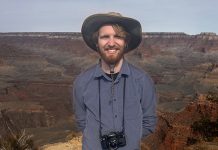
MONMOUTH COUNTY – Ocean Township resident Zac Levy was just 16 last year when an unexpected encounter at a Boston 7-Eleven set him on a transformative path. Zac regards that brief moment as the catalyst for his decision to promote awareness about homelessness from a more human perspective.
Zac and his father, Izzy, had decided to make a quick stop at the convenience store while they were in Boston visiting Zac’s brother, a Brandeis University student. While standing in the checkout line, Zac’s focus shifted to a young woman who appeared to be just a couple of years older than him.
“She was clearly homeless,” said Zac. “She wasn’t able to afford the things she was trying to buy, and my father went to the front and paid for her.”
When Zac and his father left the store, Zac couldn’t shake the feeling that the young woman he had seen inside was homeless. His observations were further confirmed by the sight of her possessions strewn around her outside, surrounded by other people nearby who seemed to be living on the street.
The experience left Zac with a lingering question about how someone so young could end up in such a dire situation. He chronicled his quest to find answers in “Project Unhoused,” available on Amazon, and described as “a teenager’s journey to share the stories of America’s homeless.”
A High Technology High School senior, Zac is no stranger to performing in-depth research assignments. When he first decided to look into the homelessness issue, he found he could easily uncover numbers and statistical analysis. Much of the research focused on the lack of affordable housing.
“What I didn’t find was a lot of stories,” Zac shared. “I figured there was a whole lot that wasn’t in academic sources and learned about stereotypes from people in online forums.”
Zac said the overall findings conflicted when he initially began his research. He identified a need to discover the underlying issues related to homelessness by delving into life stories. Izzy accompanied his son as Zac set out to interview those he calls “unhoused.”
Paul McEvily of Interfaith Neighbors helped Zac connect with other nonprofit organizations that assist needy people. At Lunch Break in Red Bank, Zac worked with Kevin McGee to meet people. He also conducted some interviews at the JBJ Soul Kitchen in Red Bank.
“What was interesting is that I saw one of the people in two different environments,” said Zac. “I first saw her at Lunch Break and later at Soul Kitchen.”
Zac recalled the sad look that surfaced when he first met the woman, who he said was in her seventies. She and her daughter, who is in her fifties, are both homeless and have had hard lives. On his second encounter with the older woman, Zac barely recognized her as she was smiling, standing straight, and had better clothes.
At the Jersey Shore Rescue Mission in Asbury Park, Zac found another group that offered help to men and women experiencing homelessness. The organization not only served dinner but also a period of time where showers were made available and overnight beds.
“I did eight interviews overall and intend to do more,” Zac shared. “A lot of people talk about people who wind up being homeless because of drug abuse. But you don’t hear a lot about how people end up using drugs to supplement other problems in their lives.”
“Instead of just looking at the end result of someone experiencing homelessness, my goal over the last year has been to look into every step of these people’s lives from their childhood until their eventual descent into homelessness. Many claim that drug abuse and mental health are the primary causes of homelessness, but that is not what I found in my interviews. I’ve come to view them as a symptom of more fundamental problems.”

Zac said that three people he interviewed had never touched drugs or had mental health problems. Some had fallen through the cracks for financial reasons, and others had been victims of natural disasters like Superstorm Sandy.
“One person’s apartment was completely destroyed and had mold infestation,” Zac said. “She got very sick because of the mold infestation, and at 65, can’t work.”
Many of the people Zac interviewed were senior citizens with limited financial resources. Among them was an 80-year-old woman who has been living in her truck.
“She’s living on Social Security and makes enough to eat, pay for gas, and repair her truck,” Zac said. “But she can’t afford an apartment and is working with Lunch Break to find government assistance.”
The same woman has never had a drug problem or mental health issues. Last year, she had a three-month reprieve from the cold as she moved from church to church. The nonprofit group, Women’s Hospitality Network, arranged the emergency housing within their 12-bed capacity.
After providing some small snippets of his interviews, Zac was kind enough to share a brief preview of his finished book. The conclusion of “Project Unhoused” unveils the growth of a young man who ventured into a world totally foreign to his everyday existence.
Now 17, Zac revealed that reading about other people’s lives gave him different lessons than he gained from real-life interviews.
“I didn’t just hear their words,” said Zac. “I tried to live through their stories. It only occurred to me later that this is the difference between sympathy and empathy. I attribute this emotional development to this new perspective through which I view others and our absolute interconnectedness.”
The eight interviews collected in “Project Unhoused” represent a small sampling of the bigger picture, according to Zac. He plans to further his mission and hopes other like-minded youth will join him in assisting people experiencing homelessness in their communities.
More information about Zac and “Project Unhoused” can be found at projectunhoused.com. Proceeds from the sale of the book are given directly to America’s homeless population.






